FILTER TECHNOLOGY
Drinking Water Filter
According to the reports by CCIJ (Center for Collaborative Investigative Journalism) and GroundUp in November 2022, out of a 144 municipalities that treat and supply water in South Africa, 94 were failing as of 11 October 2022.
(Articles: https://ccij.io/article/taking-matters-into-their-own-hands/; https://www.groundup.org.za/article/water-in-two-thirds-municipalities-does-not-meet-minimum-standards/ )
So how do you choose a water filter that works for you?
Knowing what’s in your water and what you would like to remove, will help the decision-making process. While most filters vary depending on the make and manufacturer, there are some general guidelines to consider.
- Don’t get caught into buying bottled water
Many (typically cheaper) bottled water brands are simply bottling tap water, with some undergoing further filtering and/or purification and then packaging into plastic bottles.
Prices may also vary between the different brands, but it’s estimated that bottled water can be as much as 250 to 10,000 times more expensive than just the filtered water as you, the consumer, is not only paying for convenience and packaging, but also paying for the massive marketing efforts by these brands. Over time, these costs add up.
Investing in a water filtration system at home, a fridge with a filter, or even buying a simple jug filter, will give you a much cheaper, environmentally friendly way to keep hydrated at home, and provide clean water for cooking. Filling up your re-usable bottle and remembering to take it with you will help you avoid the expense and wastage when out and about.
Besides, some of the bottled waters still have the exact same contaminants you’re aiming to avoid. Added to that, the water could be absorbing poorly understood compounds that may be harmful to our bodies. The bottled water industry is incredibly wasteful, unaccountable and harmful to the environment in several ways.
- The production of plastic and dealing with the huge amounts of plastic waste generated by disposable bottles is a major strain on the world’s resources. Most bottles end up in landfill or incinerated (burning plastic isn’t ideal either).
- Bottled water is transported using fossil fuels, sometimes at great distances. Even if this was slightly more justified for special-composition mineral waters, it often occurs for corporate logistic reasons with water that’s no different from purified tap water from the municipal supply.
- Glass bottles don’t generate the mountains of waste, but production of glass also has environmental consequences, while the transport of heavier bottles uses more fuel.
- And finally, extraction of water for bottling can damage local environment, and deprive local environment and whole ecosystems of water they need to flourish.
Comparing the pros and cons of filtered and bottled water, the choice is obvious: for use at home, filtered tap water wins hands down, and should be also used when out-and-about if possible.
So where do we go from here? Let’s look at the current options available.
- Pitcher filter
Pitcher filters typically reduce only a few contaminants (such as chlorine), plus the water sits in plastic for an extended period of time and may pick up chemicals from the pitcher itself!
Though inexpensive, pitchers are effective mainly at improving the taste and odor of your water and will leave many contaminants of concern.
Similarly, the simple filters in water-dispensing refrigerators only remove a relatively small number of contaminants, but be sure to read the fine print.
- Faucet-mount filter
Some faucet-mount filters remove a decent number of contaminants.
Again, be sure to read the fine print to see they’re removing what you want them to, as filter performance varies widely. Though faucet mount filters are inexpensive and easily replaced without special skills, if you look carefully at how long a filter lasts and replacement filter costs, you may find that a more effective filter – though initially somewhat more expensive – does not cost much more in the long run.
- Countertop Water Filter (Typically ultrafiltration)
Countertop filters don’t take up space under your sink, but do require space next to the sink to be hooked up to your faucet, or elsewhere if it is a freestanding, gravity-fed filter. Neither requires a plumber to install, but the advantage of a filter hooked up to your waterline is that you don’t have to refill a filter container constantly.
Maintaining countertop filters are easy and usually requires no special tools. For some of these water filters, maintenance is quick and may only be needed after a few months — depending on the amount of sediment in your water. Replacement filters are also not expensive.
- Under counter filter (Typically ultrafiltration)
An under counter filter makes sense when counter space is in limited or if a countertop unit is not aesthetically appealing. Like the plumbed-in countertop filters, an under counter filter does not require refilling.
Depending on the brand and manufacturer the unit sizes, capacity and installation requirements, replacement filters vary significantly, as well as their prices.
One has to consider what you are getting for the price you are paying as some brands may be cheaper starting off with, but will require more frequent filter replacements as their capacity is limited.
The SYR POU filters are backwashable, prolonging the life of filter, reducing the frequent maintenance filter replacements and extremely compact with the four stages in a single unit.
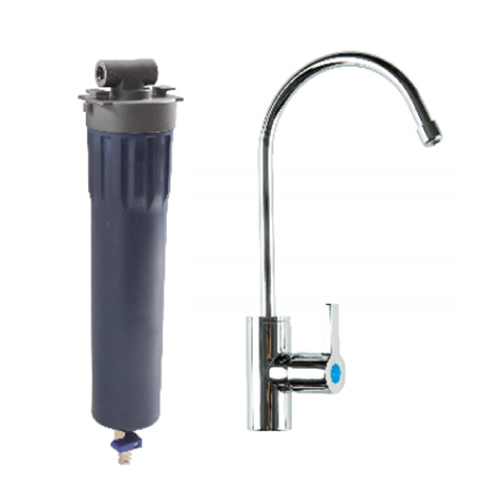
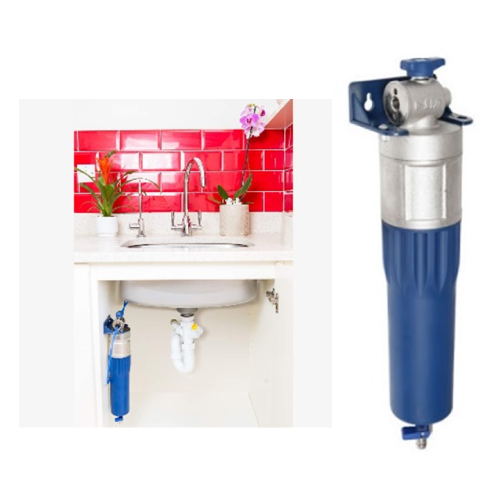
- Reverse osmosis (RO)
While very effective at removing elements (including the beneficial minerals) and contaminants, reverse osmosis (RO) filters are expensive and waste roughly between 56% and 80% of the water it is filtering ─ depending on the system.
A typical RO unit is extremely bulky and requires a lot more space than the alternative filters and it is also recommended to be serviced annually.
- Shower filter
A simple shower filter can eliminate chlorine from your water which should make your skin and hair feel softer and can reduce the chlorine absorption through your skin. This is a very limited filtering option.
- Inline Sediment filter
Total suspended solids (TSS) affect the water clarity, the more solids present in the water, the less clear the water will be.
These are particles that are larger than 2 microns which are found in the water. These solids include anything floating or drifting in the water, from sand, sediment and silt, to plankton and algae.
If these particles are left to flow into our water supply, it could result in clogged aerators, and sediment in your appliances which could cause costly damages.
The smaller the micron rating, the finer the particulates will be that is allowed through.

The JETFI and Ratchet manual backwash filters trap these particles and prevent them from entering the water supply. Their high flow rates make them ideal for any point of entry filtration. Mesh width: 40µm
The JETFI is capable of continuous filtered water supply even during backwashing. It’s impeller system allows the flushing out of even the stubbornest of particles.
Depending on the water quality, the filter should be backwashed every two months in order to rinse out any debris/sediment that may have accumulated in the filter.
SYR offers an extensive range on sediment filters, and some include functions as integrated pressure reducers and automated backwashing.
- Drufi filter
- Ratio filter
- JETFI filter
- Ratchet filter
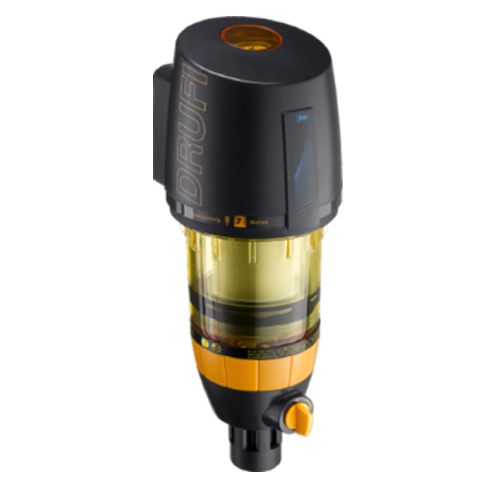
Drufi filter
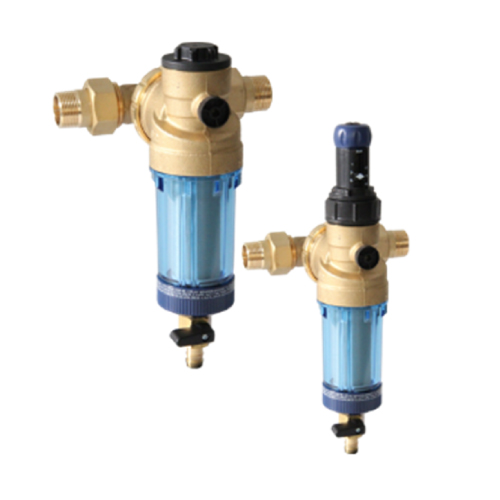
Ratio filter
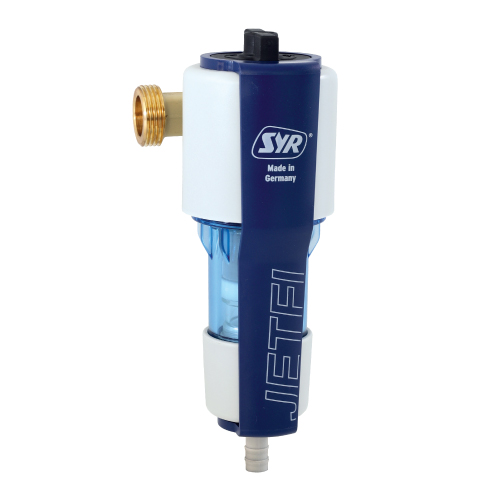
JETFI filter
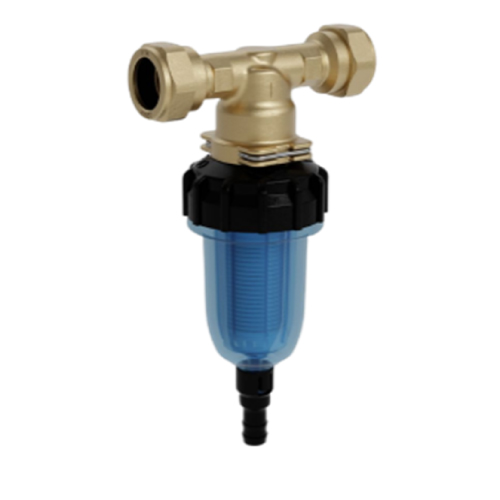
Ratchet filter
- Whole house water filter
Whole-house filters remove certain contaminants from water as it comes into the house, but they won’t take out as many contaminants as a drinking water filter, so it’s important to also have a quality drinking water filter. A quality whole house filter can also be quite expensive, but may be worth considering if you’re seeking to significantly lower your exposure to chlorine or chloramines.
Systems and prices vary and are typically tailored to the needs of the customer. Backwashing options prolongs the lifespan of these filters resulting in lower maintenance costs.
- What about fluoride?
Fluoridation is not practiced in South Africa, and the fluoride levels are relatively low.

